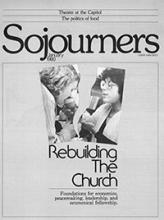As this month's Sojourners goes to press, we face the threat of war with Iran. Fifty United States citizens have been held hostage in the U.S. embassy in Teheran for more than six weeks. The frustration of the American public is intensifying. Angry feelings of revenge and racism against the Iranians boil just beneath the surface, sometimes breaking out in ugly demonstrations. The political climate is increasingly self-righteous, demanding "toughness" from an insecure president facing a difficult re-election campaign.
Most Americans seem genuinely astonished at the depth of the Iranian people's anger toward the United States. Confused and defensive, they appear quite unable to understand why their country has been singled out for attack and wonder aloud, "Who do these people think they are?" This may be the most significant thing to recognize in the present crisis, for it demonstrates that the American people have not come to terms with the role of their government in the world.
In August of 1953, the nationalist prime minister of Iran, Mohammed Mossedegh, was overthrown. The coup was organized by Kermit Roosevelt of the Central Intelligence Agency, a grandson of another Roosevelt who was also quite experienced in intervening in the affairs of other countries. Having been restored to power, a grateful Shah Reza Pahlavi told Mr. Roosevelt, "I owe my throne to God, my people, my army--and to you."
From that day until he was forced to flee his country by a popular uprising last February, the shah's principal backer was the United States--politically, militarily, and economically.
In exchange, the shah supported American political and military interests in the area while pursuing Western-style capitalist development. Every Iranian knows this.
Read the Full Article

